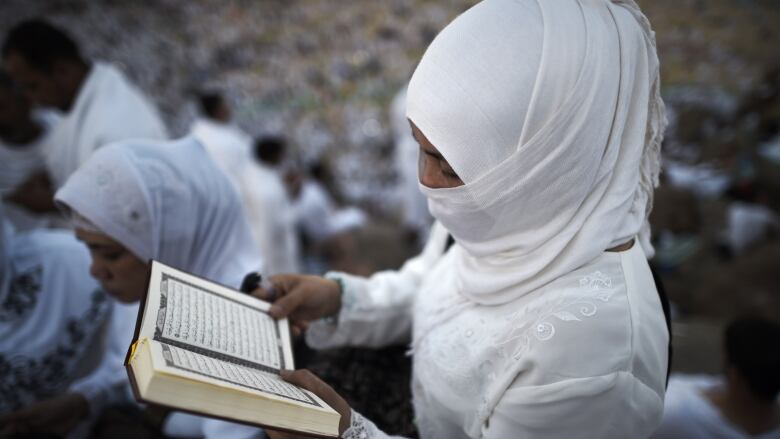'I reject the silencing of women in any community': #MosqueMeToo creator speaks up for those who can't

Mona Eltahawy was 15 years old when she was sexually assaulted on the Hajj pilgrimage in 1982. A Saudi policeman groped her breast when she bent down to embrace the black stone. This was before another incident when she also experienced a man intentionally put a hand on her backside.
"I burst into tears after many minutes of not being able to get away from the grip of this sexual predator," Eltahawy said.
At the time, she had no words to deal with what happened; but now she speaks up for Muslim women who can't, under a hashtag of solidarity: #MosqueMeToo.
"It's very hard to share your experience of sexual assault anywhere, of course it is," Eltahawy said. "But imagine the multiple layers of difficulty when you're trying to expose sexual assault at the holiest site for Muslims in sacred space."
I have shared my experience of being sexually assaulted during Haj in 1982 when I was 15 in the hope that it will help fellow Muslim women break silence and taboo around their experience of sexual harassment/abuse during Haj/Umra or in sacred spaces. Let’s use <a href="https://twitter.com/hashtag/MosqueMeToo?src=hash&ref_src=twsrc%5Etfw">#MosqueMeToo</a> <a href="https://t.co/uDsZFDolgX">https://t.co/uDsZFDolgX</a>
—@monaeltahawyEltahawy described the dilemma Muslim women face when speaking out about any kind of abuse within the community as being caught between a rock and a hard place:
"The rock is a racist, Islamophobic right-wing that exists globally, that is all too eager to demonize Muslim men and wants to weaponize my words, and the words of any Muslim women speaking out against Muslim men," she said. "And the hard place is a Muslim community that feels beleaguered by these racist Islamophobes and the right-wing and wants to defend Muslim men ... and would rather Muslim women shut up."

For Eltahawy, it took many years to be able to say she was sexually assaulted in Mecca, and not everyone was pleased to hear her story.
"When I finally started to speak out, I was warned by an Egyptian Muslim woman to stop saying this in front of non-Muslims because it would make Muslims look bad," she explained.
The feminist author is not alone in the backlash. After reading Sabica Khan's Facebook post about being sexually harassed while performing the tawwaf — the circling of the Ka'aba — she found out Khan faced an onslaught of abuse and hate.

The tweet that went viral
"I realized that Sabica was a young woman who didn't have the platform that I have, and was not heard as I am and I consider all of what I have a form of privilege," she said.
"I believe if you have privilege you're obliged to fight ten times harder than those who don't."
To support Khan, Eltahawy shared her story again on Twitter — and this time, it went viral, with people sharing the tweet in Urdu, Hindi, Arabic, Turkish, French, German and Spanish.
"I had said in my thread: I want my Muslim sisters to share their experiences under #MosqueMeToo. Let's speak out if we can because many women can't at the moment."
I could write a book called “Things You will Hear When You Say You’ve Been Sexually Assaulted,” with each of these as a chapter titles: <a href="https://twitter.com/hashtag/MosqueMeToo?src=hash&ref_src=twsrc%5Etfw">#MosqueMeToo</a> <a href="https://t.co/gJfVXokU3u">pic.twitter.com/gJfVXokU3u</a>
—@monaeltahawyEltahawy said she wanted the hashtag to not only be a space to recognize each other's experiences, but to have Muslim men realize this is not just happening in Hollywood.
"I wanted to place this squarely as a Muslim thing for Muslim women, and to confront this denial that this doesn't happen. It does happen and this idea that 'no, no we're too good for this' is also one of the factors that is silencing women," she said.
"I reject the silencing of women in any community."
A message to women
Eltahawy encourages all women to take care of themselves and hopes this conversation continues.
"Let's talk as women about how we can better defend ourselves and insist that men stop assaulting us," she said.
"And most importantly for those of us who can speak out, speak out now."
"I would love a day where we're all able to speak, and if we don't hear the voices of everyone, we have to ask why."
Listen to the full conversation that includes hearing from Imam Syed Soharwardy at the top of this page, where you can also share this article across email, Facebook, Twitter and other platforms.
This segment was produced by The Current's Ines Colabrese, Rosa Kim and Samira Mohyeddin.